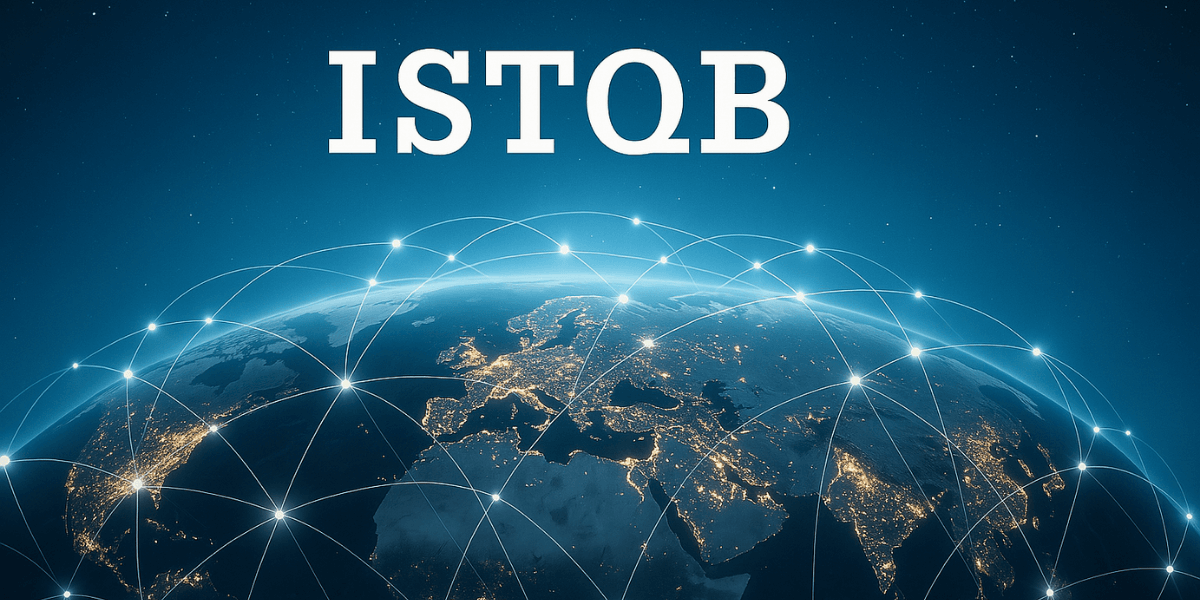Home > Why Get ISTQB Certification to Become a Software Tester?
Are you a software tester looking to kickstart your career? The ISTQB certification might just be the game-changer you need! This article explains how this globally recognized training can boost your skills and attract new career opportunities. Ready to take it to the next level and stand out as a certified tester?
Let’s explore why this international credential makes a real difference today. ISTQB certification doesn’t just validate your knowledge—it’s a common language for recruiters across the industry. Surprisingly, many professionals still hesitate to take the leap… Yet salary growth statistics speak for themselves! However, earning this certification requires solid preparation. The exam covers both foundational knowledge and real-world scenarios. It’s an investment of time that pays off during interviews, where you’ll confidently justify your methodology. Distinctive sign? Your profile instantly gains credibility compared to self-taught testers. So, ready to transform your approach to testing?

The ISTQB has become a global reference. Its certification is recognized in 120 countries, a major asset to boost your credibility. Did you know that this recognition can open international doors? The ISTQB certification, internationally recognized (source), had administered 1.4 million exams and issued more than 995,000 certifications across 130+ countries as of June 2024. Definitely something to inspire you to get started!
Multinational companies and public institutions actively seek out ISTQB-certified profiles. Why such enthusiasm? Simply because a tester who has undergone approved training and passed demanding exams masters the fundamental techniques. A real time-saver in recruitment processes! These organizations know they are hiring experts who can quickly adapt to their Agile tools and methods.
Good to know: some companies even require the Foundation level to access their technical testing. This trend is becoming more common, especially in the critical software sector. Proof that this certification is far more than just a line on a résumé!
The ISTQB framework acts as a professional passport for testers. In concrete terms, it assesses your software testing skills through an internationally recognized exam. Earning this certification means proving you master fundamental techniques like test automation and scenario management.
Employers often hesitate when facing non-certified candidates. Why? Because an ISTQB training covers the complete syllabus of best practices—unlike many self-taught paths. The result? Certified profiles land more interviews. And it makes sense! Mastery of tools like Selenium or Jira is becoming almost a prerequisite in major companies.
This certification also lays the foundation for Advanced and Expert levels. A smart investment, especially knowing that ISTQB-certified testers see an average salary increase. Ready to take the next step?

The ISTQB boosts your professional profile by opening doors to dynamic sectors. Certified training clearly accelerates your path to higher-paying roles.
With an ISTQB certification, you officially validate your testing skills. Tech companies are actively searching for profiles like yours.
Concrete proof: several alumni secured promotions in the FinTech sector 6 months after the exam. The syllabus even covers the latest trends like automation—a real boost for your CV. And in terms of salary? Expect an increase depending on your level of expertise.
The ISTQB structures its programs into Advanced and Expert levels for certified testers. This progressive training system allows you to acquire advanced technical skills, with specializations such as Test Analyst or Test Manager. For these demanding exams, regular practice through mock tests and syllabus study is essential. Good to know: some companies even offer tailored preparation programs.
These advanced techniques quickly become valuable in managing complex projects. Here’s a real-world example: developing banking software or critical automation systems often requires ISTQB-certified testers. Why? Because their mastery of testing tools and processes provides real added value in terms of reliability. It’s worth noting that tech recruiters now often prioritize these certifications for senior roles.
The ISTQB Foundation level is actually a prerequisite for accessing expert-level training. Important detail: each level is based on real-world case studies rather than pure theory. Perfect to sharpen your professional reflexes before the final exam!

Discover how to structure your training journey with this comparison between the Foundation and Advanced modules. A quick glance to choose the level that fits your experience!
| Certification | Target Audience | Main Objective | Difficulty Level |
|---|---|---|---|
| Foundation Level | Beginners in software testing | Learn the basics of software testing | ★☆☆☆☆ (Easy) |
| Agile Tester Foundation Level | Testers in Agile environments | Understand and apply Agile testing methods | ★★☆☆☆ (Easy to moderate) |
| Advanced Level (Test Manager, Test Analyst, Technical Test Analyst) | Experienced professionals | Deepen specialized skills | ★★★★☆ (Difficult) |
| Expert Level | Testers aiming for leadership roles | Master advanced test management strategies | ★★★★★ (Very difficult) |
| AI Testing | Testers on AI projects | Test AI-based systems | ★★★☆☆ (Moderate) |
Wondering why you should adopt this standardized vocabulary? Simply because it makes collaboration with Agile teams much easier on a daily basis. This shared terminology streamlines processes and reduces the risk of misunderstandings. Did you know that the ISTQB® glossary is an international reference for software testing? (source). It’s a true linguistic passport for testers working with technical teams or international companies!
This 3-day training lays the foundation for ISTQB® certifications. Ideal for mastering the basic techniques of testing, it is designed for both newcomers and professionals transitioning to a new career. A strategic first step before moving on to Advanced or Expert levels.
It’s worth noting that tech companies now increasingly prioritize certified candidates in their hiring processes. Another great reason to take the exam!
In summary:

The ISTQB mention appears in many job listings, and it’s no coincidence. It’s clear: companies are actively seeking certified profiles, especially for roles like software tester, automation engineer, or testing project manager. Did you know that some job offers even specify the required certification level?
Highlight this asset on your CV. During interviews, emphasize the techniques learned during your training: test case management, mastery of automation tools… A good example? Explain how ISTQB helps you organize testing within Agile company processes. Often, it’s this kind of detail that makes all the difference with recruiters!
Good to know: the ISTQB certification officially guarantees your skills in software quality management. The associated trainings cover both the foundational aspects and more advanced levels like the Advanced Level, perfectly matching real-world market expectations!
The ISTQB certification opens doors to project management, even for technical profiles. It’s a real asset for developing skills in test strategy, planning, and team management. In practice, many start with the Foundation level before moving on to Advanced certifications in test management or automation.
A certified test manager has stronger mastery of tools and processes to manage complex testing. Their role? Adapt the strategy to the real needs of the project, plan technical testing, and coordinate a multidisciplinary team. Managing non-certified testers requires real training work: sharing best practices.

Certifications evolve with new technologies. Did you know that the certified ISTQB version (Foundation and Advanced levels) remains valid indefinitely? A significant advantage to secure your technical skills over the long term.
The organization also keeps pace with current methodologies like DevOps and AI-driven test automation. Concrete proof: their CT-AI certification specifically trains testers in intelligent testing techniques. It covers both controlling AI systems and leveraging these tools to optimize quality processes.
ISTQB actively collaborates with government institutions to harmonize testing practices. These strategic partnerships, along with recognized training programs, further strengthen its international credibility. The organization has 47 members covering 71 countries. In France, the Comité Français des Tests Logiciels (CFTL) supervises certification exams. A recognition that extends beyond borders, endorsed by both companies and public institutions.
Unlike some local alternatives, ISTQB offers a certified framework usable in any Agile environment. Regional certifications often suffer from limited international reach and less rigorous validation tools. With its standardized syllabus and proven techniques, ISTQB remains the only system that certifies testers worldwide. Key advantage: its centralized management of evaluation processes avoids discrepancies between countries.
Every euro invested in an ISTQB training could yield a return on investment of over 1500%. How? Through salary increases and access to strategic projects. A well-prepared certified exam becomes a real career accelerator. Did you know that in software quality management, fixing a bug after production costs much more than during the testing phase? That’s exactly the risk certified experts are trained to minimize, saving companies thousands of euros every year.
Real-world feedback is clear: Managers report the positive ROI impact of certified teams. In practice, this translates into better tool mastery and more reliable deliverables. Take the example of a complete training: it covers both the basics (Foundation) and advanced methods like test automation. The result? Testers become more responsive while reducing non-quality costs.

How does the ISTQB exam work and where can you take it?
The ISTQB Foundation Level exam includes 40 multiple-choice questions covering the entire syllabus. You must correctly answer at least 26 questions (65%). The exam can be taken online or at an accredited test center.
What is the difference between ISTQB and other software testing certifications?
Unlike vendor-specific certifications (focused on one tool), ISTQB is technology-independent. It covers the fundamentals of software testing and is internationally recognized by employers.
Does ISTQB cover different types of testing?
Yes. ISTQB offers specialized modules (security, performance, agility, etc.) to allow testers to train in specific areas.
Are there pathways between ISTQB and other IT certifications?
Yes, particularly with Agile (CTFL-AT) and DevOps certifications. The ISTQB Foundation certification often serves as a stepping stone toward other specializations.
How long is the ISTQB Foundation certification valid?
The Foundation certification does not expire. It is valid for life, unlike other IT certifications that require periodic renewals.
Can you directly attempt an ISTQB Advanced certification without the Foundation level?
No. You must first obtain the Foundation level before aiming for an Advanced or Expert certification.
In which languages can you take the ISTQB exam?
The exam is available in several languages, including French and English, depending on the organization and format chosen.

ITTA is the leader in IT training and project management solutions and services in French-speaking Switzerland.
Our latest posts
Subscribe to the newsletter
Consult our confirmed trainings and sessions

Nous utilisons des cookies afin de vous garantir une expérience de navigation fluide, agréable et entièrement sécurisée sur notre site. Ces cookies nous permettent d’analyser et d’améliorer nos services en continu, afin de mieux répondre à vos attentes.
Monday to Friday
8:30 AM to 6:00 PM
Tel. 058 307 73 00
ITTA
Route des jeunes 35
1227 Carouge, Suisse
Monday to Friday, from 8:30 am to 06:00 pm.